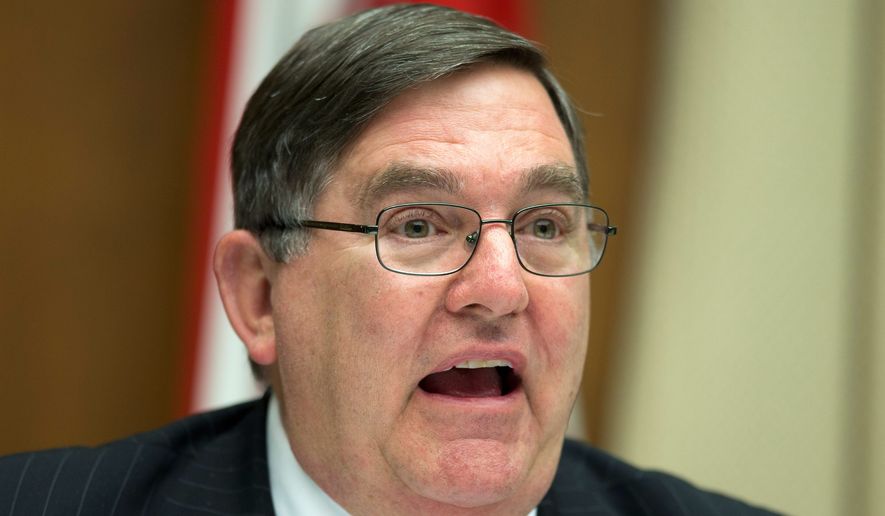The normally fractious House made governing look effortless Thursday, passing a long-sought deal to permanently cancel Medicare budget cuts that eat into doctors’ pay, erasing a perennial political headache while praying that a set of replacement reforms will help pay for some of the $200 billion in new spending.
The 392-37 vote, led by top Republicans and Democrats in the House, puts immense pressure on Senate Democrats to follow suit before lawmakers dash off for a two-week spring break.
President Obama has embraced the compromise despite language that continues a ban on spending federal taxpayer money for abortion, and backers are expecting Senate Democrats to cave on their objections after seeing such a lopsided vote in the House.
“They’ve got to pay attention to it,” said the bill’s Republican author, Rep. Michael Burgess of Texas.
It was unclear whether the Senate would take up the bill before leaving Capitol Hill, though, as lawmakers settled in for a late-night marathon of budget votes and even some conservatives expressed doubts about the House deal.
“Even by Washington standards, this is phony math,” said freshman Sen. Ben Sasse, Nebraska Republican, arguing that the legislation missed a chance to enact true Medicare reform with bankable savings. “This is a Nancy Pelosi bill.”
House Speaker John A. Boehner, Ohio Republican, teamed up with Mrs. Pelosi, the Democratic minority leader from California, to craft the package, which would repeal the nearly 2-decade-old Sustainable Growth Rate, which was designed to rein in ballooning deficits by limiting the growth of payments to doctors who treat Medicare patients.
Congress has never allowed the cuts to go into effect, regularly passing short-term fixes — sometimes offset by other cuts, and sometimes tacked onto the deficit.
This week’s replacement would give doctors a half-percent pay raise each year for the next five years while streamlining programs that evaluate their performance. It also requires wealthier Medicare recipients to pay higher premiums starting in 2018 and reduces scheduled rate increases to hospitals and other providers.
“This will be the first real entitlement reform that we’ve seen in nearly two decades. And that’s a big win for the American people,” Mr. Boehner said. “It was a true bipartisan agreement.”
The Congressional Budget Office estimated that the legislation will cost $214 billion over the coming decade, with about $140 billion tacked onto the deficit and the rest primarily covered by higher-income Medicare recipients and providers.
The bill enthused the doctors lobby but unsettled some conservatives, who said they could not rely on savings in the long run, even if the annual patches felt undignified.
“We cannot continue to solve every problem by adding to the deficit,” said Rep. Jim Bridenstine, Oklahoma Republican, who was one of 33 Republicans and four Democrats voting “no.”
Republican leaders rallied support for the plan by spotlighting a portion of the CBO’s analysis that said savings from higher-income Medicare recipients will “increase rapidly” in the second decade after enactment. They also said the permanent fix clears the way for sweeping entitlement reforms.
The House floor debate was uncommonly genial. Republicans even wished Mrs. Pelosi a happy birthday from the floor.
Some lawmakers felt the moment foretold good things to come, despite frequent rancor within the Republican caucus and partisan fights over health care and spending.
“I think we’re showing that we have a majority that is working,” said Rep. Paul Ryan, Wisconsin Republican and House Ways and Means Committee chairman.
The Senate would have to work fast to beat an April 1 deadline to avert a 21 percent pay cut to doctors.
If they cannot act in time, the administration might delay Medicare claims until Congress finishes the job, or impose the scheduled pay cut under existing law, lawmakers said.
Senate Democrats wanted to see the Children’s Health Insurance Program authorized for four years instead of two in the House package. They also dislike language banning community health care centers from spending federal funds on abortion, although that concern started to wane during the week.
House Democrats said they were able to look past the same misgivings, citing the appeal of fixing a national problem on a bipartisan basis.
“Who knows, I mean, if this is contagious maybe next week we’ll deal with climate change,” said Rep. Jim McGovern, Massachusetts Democrat.
• Tom Howell Jr. can be reached at thowell@washingtontimes.com.




Please read our comment policy before commenting.